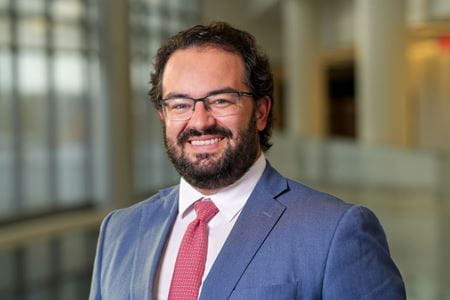As a medical student in Brazil, João Paulo Almeida, MD, PhD, developed a deep interest in the intricacies of the brain and skull base anatomy. Immersing himself early in the operating room, Almeida felt drawn not only to the scientific rigor of neurosurgery but to the artistry it demands.
That fascination for the brain set the foundation for Almeida’s career defined by technical mastery, academic leadership and a global commitment to surgical education.
Almeida joined the IU School of Medicine Department of Neurological Surgery as the Robert L. Campbell Scholar in Neurological Surgery in November 2024. He has extensive training, with clinical fellowships completed at the University of Toronto and the Cleveland Clinic. Prior to joining the IU School of Medicine, Almeida served as assistant professor at the Mayo Clinic in Florida.
Within the Department of Neurosurgery, Almeida serves as the director of skull base and pituitary surgery and brings a vast track record in endoscopic skull base approaches, pituitary tumor resection, and complex cranial surgery.
“What motivates me is the complexity and beauty of neurosurgery,” Almeida said. “Mastery in the operating room begins with mastery of the anatomy — it’s an evolving art form grounded in precision, repetition, and lifelong learning.”
That passion for neurosurgery grew even stronger during his residency training. While at the State University of Campinas in São Paulo, Brazil, Almeida trained under legendary neurosurgeon Evandro de Oliveira, MD, PhD — a protégé of world-renowned neurosurgeons Albert Rhoton Jr., MD, and Gazi Yasargil, MD — whose pioneering work in microsurgical neuroanatomy inspired Almeida during his training and career.
Now, with more than 15 years of clinical experience and expertise in skull base and pituitary surgery, Almeida is launching an innovative microsurgical neuroanatomy laboratory at the IU School of Medicine. The lab will serve as a center of excellence for advanced surgical training, research and global collaboration.
The new lab, which is temporarily located near IU Health Methodist Hospital, will move to a cutting-edge surgical skills center in the IU School of Medicine Medical Education and Research Building, slated to open in 2025. In partnership with the Department of Otolaryngology—Head and Neck Surgery and the Department of Neurological Surgery, the lab will train residents and fellows in transcranial microsurgery and endoscopic skull base techniques using simulation and cadaveric dissection.
“You don’t learn on people. You take care of people,” Almeida said. “The lab provides a space for deliberate practice. It is where technical skill becomes surgical artistry.”
The lab will host a training program for neurosurgeons from around the world who are in their final stages of training or have recently completed residency. In 2025, seven fellows from Brazil, Italy, Argentina, Colombia, Turkey and Mexico will rotate through the program. A similar initiative Almeida led at his previous institution trained 15 fellows from 10 countries.
“To bring neurosurgeons from all over the globe to IU is not just exciting,” he said, “it’s transformative.”
Almeida is a strong advocate for cross-cultural exchange in medicine. He frequently travels to lecture, collaborate and teach in different countries, drawing on the global perspective instilled in him during training.
“I learned from my mentors that we must seek out those who are different from us because that’s how we grow,” Almeida said. “When we engage across borders and share knowledge, we elevate the entire field, and that’s what this lab is all about.”
Almeida was drawn to IU School of Medicine for its growing academic environment and the opportunity to contribute to a high-volume clinical practice at IU Health, which is actively constructing a new 16-story downtown hospital and medical campus next to the new research and education building. The collaborative potential with other institutions in the region, like Purdue University and the University of Notre Dame, was also a motivator for Almeida.
In parallel with his clinical expertise, Almeida has established himself as a leading academic neurosurgeon. He has authored more than 130 peer-reviewed publications and contributes to major neurosurgical textbooks, serves on editorial boards of major journals, and frequently lectures at national and international conferences.
Almeida’s research focuses on surgical outcomes, anatomical innovation and the integration of artificial intelligence (AI) and computer vision in neurosurgical performance evaluation. He is co-developing a multi-center, AI-driven database to objectively assess technical proficiency and surgical outcomes — an initiative that will be closely tied to the new microsurgical anatomy lab.
“There’s a strong momentum here at the IU School of Medicine,” Almeida said. “This is a department — and a state — investing in the future of neurosurgery. We’re building something that blends tradition with innovation — creating a space where neurosurgery is not only practiced but perfected.”
